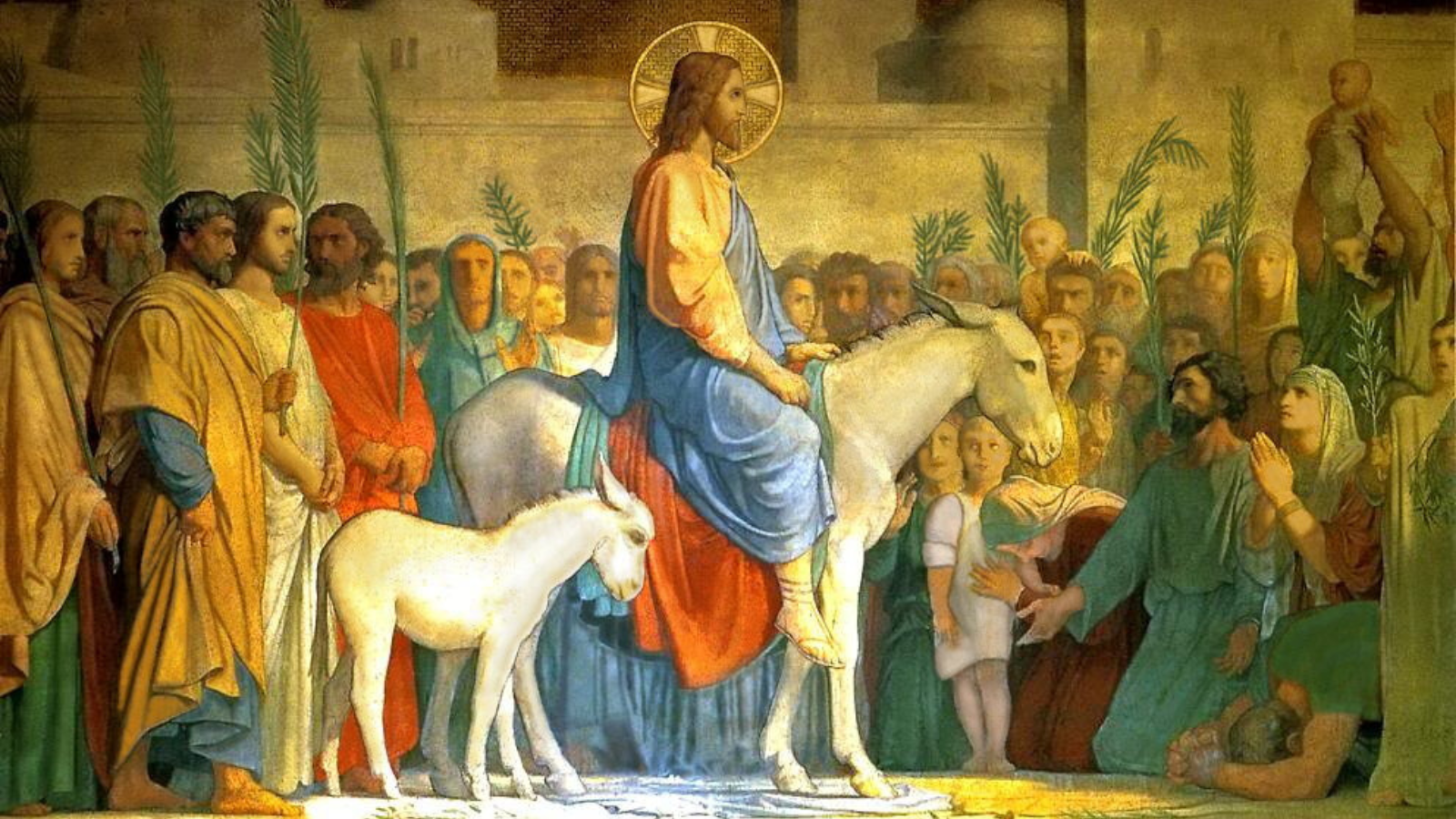
Jesus’ Triumphal Entry (Luke 19) into Jerusalem offers a dramatic contrast.
On this, the first Palm Sunday which we still celebrate even on this very day, the whole story of Jesus begins quickly moving to its climax. Indeed the whole story of Israel, which had been being lived out since Abraham some 2000 years earlier, is now quickly moving to its climax when Jesus says, “Go get me a donkey”.
The story of Israel is the story of God’s rescue mission for the world that starts by God creating a people and then sending them a King so that the whole world would be the Kingdom of God. And here comes that King now, riding into Jerusalem. That’s what the Jews–a beleaguered, oppressed people living under Roman occupation–had been hoping for, and that’s what they saw, their King, and so they shouted out. “Blessed is the King who comes in the name of the Lord! Peace in heaven and glory in the highest!” (Luke 19.38) They shouted, they sang, they praised God, they threw down their cloaks in front of the donkey like a red carpet, along with palm branches, some that they waved as a sign that surely this King would cast off the Romans and restore their city and their identity and their dignity and vindicate their God. It would have been joyful, exuberant, jubilant, and loud.
And yet, zeroing in on the lone subject of their excitement, that King is crying: “And when Jesus drew near and saw the city, he wept over it, saying “Would that you, even you, had known on this day the things that make for peace!” (Luke 19.41). The Greek word for weep here more specifically means “to weep aloud, expressing uncontainable, audible grief.” And there’s the stark contrast, the sounds of the people’s praise and the sound of the King’s tears at the same time.
Why was Jesus crying? Three reasons leap right out of the passage:
First, (v44), Jesus is crying because the Jewish people of that day did not know the day of their visitation, which means the day of their redemption. God had come down in flesh and intervened. They did not recognize God in Jesus and that Jesus was God’s son. They missed the Incarnation.
Second, (v43-44), Jesus foresees and foretells the devastating destruction of Jerusalem in just forty years time, when the city would be burned and the Temple literally reduced to rubble. No doubt some of those lining that dirt road would live to see that day, some of those same ones would be hauled off to slavery and many of them would be killed when it happened in 70AD.
The third reason Jesus is weeping is because his very own, his own people, those whom he had come to save did not know “the things that make for peace.”
This word we translate “peace” is not only one of the most important words in the Scripture, I think it’s also one of the most under-explored. In Greek the word is “eirene,” in Hebrew it is the more familiar and powerful “Shalom”. When we use that word to translate one of Jesus’ titles, it takes us into another and better realm of what his significance is and what he wants. Jesus is the “Prince of Shalom”. When he was born the angels sang out “Shalom on earth!” He loved saying to his disciples, “Shalom be with you”. When he wept over Jerusalem, he did so because the people did not know the things that make for shalom.
Shalom is an all encompassing word that means completeness, wholeness, health, peace, welfare, safety, tranquility, prosperity, perfectness, fullness, rest, and harmony. Who doesn’t want that? Tim Keller writes of it well: “Shalom means complete reconciliation, a state of the fullest flourishing in every dimension–physical, emotional, social, and spiritual–because all relationships are right, perfect, and filled with joy… The Hebrew word shalom is an extremely rich concept—it means full human flourishing in every aspect.”
So also does the Christian philosopher Cornelius Plantinga get at it, “The webbing together of God, humans, and all creation in justice, fulfillment, and delight is what the Old Testament prophets called shalom. We call it peace, but it means far more than mere peace of mind or cease-fire among enemies. In the Bible shalom means universal flourishing, wholeness, and delight—a rich state of affairs that inspires joyful wonder as its Creator and Savior opens doors and welcomes the creatures in whom he delights.”
Did you see that? Peace is not merely the absence of conflict, peace is the presence of fullness. Peace is not merely a cease-fire, rather Shalom is what happens when the way God meant things to be is the way things are. The presence of shalom is another way to speak of the Kingdom of God. That’s why this word Shalom, eirene, peace is all over the Bible. That’s why Jesus weeps when people won’t receive it or do the things that make it.
What does Jesus want? He wants peace between us and God, he wants peace for us between each other, he wants everything that’s been created to experience God’s peace, God’s shalom, God’s fullness. That’s what he came for, that’s what he was about to die for, so that we could be reconciled to God and reconciled to each other so that we all can know the goodness of God, starting from the day we say Yes to his offer and lasting all the way through eternity.
His words, said 2000 years ago on a dusty road leading into Jerusalem, come to us today and to the whole world. Would that you, would that even you, my people, would know the things that make for Shalom. What are those things? They’re not hard to understand.
The first is to receive Jesus as the King of our lives. This means believing that Jesus is who he said he is–the Son of God and the King of the world–and then learning about what he says and doing what he says. Easier said than done maybe, but not at all hard to understand. The first thing that makes for peace is to make Jesus King over your life.
The second thing that makes for peace in the world is to work for Jesus’ Kingdom in the world, to join him in his mission of making the world be the place that God meant it for, a place of shalom and flourishing for all people and all creation. What is the place of brokenness that God has set you in or put on your heart? Bring Jesus there so that that place can be a place of peace, so that those people can know God’s shalom.
So the things that make for peace are receiving Jesus as King in our lives and all that that means, and working for his Kingdom in the world and all that that means.
Palm Sunday is a great day to commit ourselves again to joining Jesus in his work of peace in our lives and peace in the world. As Holy Week unfolds we watch how far he was willing to go to make that possible.

PS: There is no doubt in my mind that Jesus still weeps today over Jerusalem, and Gaza, and Tel Aviv and the West Bank, over the trauma and terror of October 7 and the ongoing suffering of people across Palestine. This Palm Sunday, let us continue to pray for peace across the Holy Land and an end to the war, for relief for those who suffer and comfort for those who mourn, and let us pray for and support especially our Palestinian Christian brothers and sisters as they continue to work for peace along with their Jewish and Muslim counterparts. Helpful guidance for both prayer and action can be found at the Telos Group.
